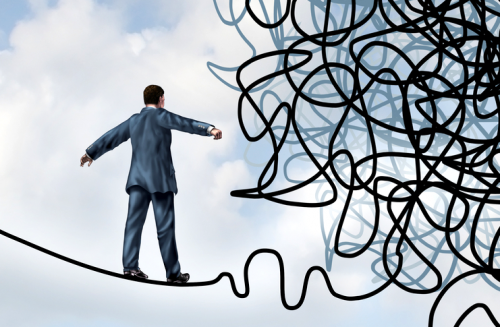The following is a transcript of an informal talk given by Olena Semenyaka during the Etnofutur III conference in Tallinn, Estonia on February 23, 2019. The transcript was made by Synchronistic Child. The video of the talk is also included here (click on the CC link for subtitles).
My name is Olena Semenyaka. I am the International Secretary of the National Corps, the parliamentary wing of the Azov movement. By education, I am a historian of philosophy. I studied the Conservative Revolution, and also Ernst Jünger’s [2] legacy, particularly his discussions with Martin Heidegger on the prospects for the new metaphysics of the West. So this is my field of interest, and of course, it involves other luminaries of the Third Way, like Julius Evola, Carl Schmitt, and the rest who formed this discourse in interwar Germany, and who are now more and more recognized even in the academic field. I could say that what I studied in theory, I developed in practice. This is the Third Way, the Conservative Revolution, but revived for today. All of these theorists were also advocates of pan-Europeanism, and that is what our projects are all about.
Jünger is fairly considered to be the face of the Conservative Revolution, because I agree with Armin Mohler that he brought the core ideas of this movement to their full extent in his creativity. My thesis is called The Transformation of the Conservative Revolutionary Subject in Ernst Jünger’s Work, from the Worker to Anarch in Ernst Jünger’s Creativity. It also reflects the primary meaning of the Conservative Revolution, which was basically defined by Friedrich Nietzsche, a godfather of the Conservative Revolution or the Third Way. You can find it in his philosophical work, the idea of the transvaluation of all values by the Superman. The point of departure is of course the event of the death of God, European nihilism and how we can overcome it.
According to Nietzsche, this is a task for the Superman. He introduces this concept in Thus Spoke Zarathustra, and he also explains some key concepts in The Will to Power, which was compiled posthumously, as well as in other key works by Nietzsche, and in On the Genealogy of Morality you can find the key statement according to which the Superman is both a nihilist and an anti-nihilist. He has to overcome Nothing. So this is the end goal of the transvaluation of all values.
The Conservative Revolution is also something like the transvaluation of all values. It is a revolutionary approach. It is not reactionary and it is not conservative, despite the title. It is moving towards the new world order, new values, and new metaphysics of the West. If you compare Ernst Jünger’s early work with his later work, it is a bit different. There is a change of perspective, but it corresponds to Nietzsche’s phases of the metaphysical transformation of all values.
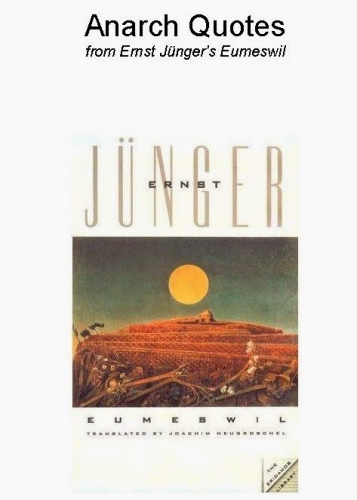 The first phase is the actively nihilistic phase. You can find this distinction in The Will to Power. Nietzsche explains that there are two kinds of nihilism. The first one is passive nihilism. It’s like a decrease in the strength of the spirit. It’s weariness. It’s weakness. It’s like a quasi-Buddhist “no” to life. It’s the will to hide from the suffering of life. So it is like an exhaustion, a devirilization, as we would say today. And for Nietzsche, of course, this was not only something metaphysical. It directly corresponded to the historical reality of Europe, and back in the nineteenth century, he said that Europe was now an aging Europe, an old Europe, a cosmopolitan Europe headed towards globalization. Not incidentally, Nietzsche was one of the pioneers of pan-Europeanism. I will also talk about that.
The first phase is the actively nihilistic phase. You can find this distinction in The Will to Power. Nietzsche explains that there are two kinds of nihilism. The first one is passive nihilism. It’s like a decrease in the strength of the spirit. It’s weariness. It’s weakness. It’s like a quasi-Buddhist “no” to life. It’s the will to hide from the suffering of life. So it is like an exhaustion, a devirilization, as we would say today. And for Nietzsche, of course, this was not only something metaphysical. It directly corresponded to the historical reality of Europe, and back in the nineteenth century, he said that Europe was now an aging Europe, an old Europe, a cosmopolitan Europe headed towards globalization. Not incidentally, Nietzsche was one of the pioneers of pan-Europeanism. I will also talk about that.
Active nihilism is healthy. It is a sign of the growth of the spirit’s strength. It means that old ideals are no longer valid, but it is also a creative process. Destruction is only one side of it. It heads towards new values. It’s like the transvaluation of all values by a Superman who destroys all discredited orders, and strives for something new, for something which will be worthy of following, developing, believing in. And that’s why the first phase of the transvaluation of all values is naturally nihilistic, revolutionary, destructive. But it’s not, again, an end in itself. It is just a phase. And that is why it is a Conservative Revolution, not a kind of conservative philosophy or a reactionary philosophy. It is revolution.
According to this theory, it doesn’t make any sense to preserve some existing order. We have to break from this historical reality, we have to be radical. At the same time, they keep in mind those healthy traditional principles, which should not be restored, but reactualized now. It is also the spherical concept of history, which was developed by the godfather of the French New Right, Giorgio Locchi, who influenced Alain de Benoist, Dominique Venner, and others, and who, of course, was inspired by Friedrich Nietzsche.
The creativity of the early Ernst Jünger corresponds with this destructive phase of the transvaluation of all values. This is in his classic treatise, Der Arbeiter (The Worker), written in 1932, and here he says it: “We are witnessing the downfall of the liberal bourgeois order. We are witnessing the downfall of the liberal bourgeois individual, and we see the advent of the new human type: the type of the Worker.” For him, of course, it was not a proletarian or a Communist revolution at all, but it was his attempt to reintegrate Marxist discourse into the higher paradigm, which would neutralize its destructive effects. I mean economic reductionism, first of all. He described the Worker as the Gestalt of the Worker, a metaphysical Gestalt, which in terms of the philosophy of culture, and an analysis of myth and of mythology, corresponds with the Titan Prometheus: Homo faber, meaning the archetype of productivity, technology. For him, it was nothing but technological forces, Titanic forces, which break free from their chains – Titans which enter the historical arena, straight from the Tartars. And now, as Jünger writes in Der Arbeiter, the Titan Prometheus mobilizes the world by means of technology.
Technology is the uniform of the Worker. And it produces both some collectivist subjects, which again correspond with totalitarian, authoritarian orders which were unfolding in the 1930s, and also produce some higher human types, like the Superman. And he welcomed this process. He attacked this fake artistic freedom, these Leftists who whine about authoritarianism, about state control. He welcomed these totalitarian orders, in fact. And he said that now work becomes like a lifestyle. We can see that people’s faces are acquiring the features of masks, you can see that the difference between leisure time and work is breaking down, it is disappearing. There is a passion for uniforms, for a single rhythm for everybody in society.
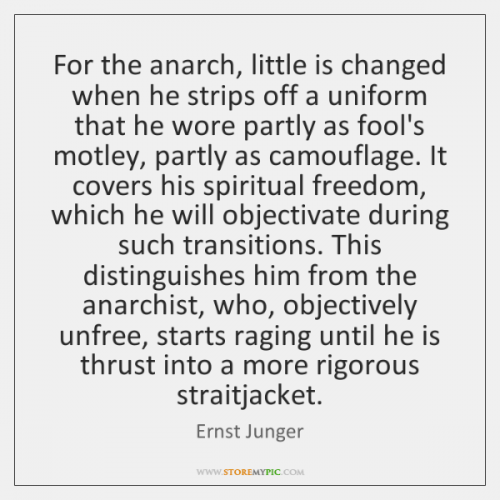
People acquire these features of technology: impersonal power, efficiency, strength. But, at the same time, although Jünger was completely sound when he described these growing totalitarian orders not only in Bolshevik Russia or interwar Germany, he also saw the same signs in France, in England, in the democratic countries, and he said the media are used to create these uniform societies, not only in Russia or Germany but also in the democratic countries. He was right to say it. In the 1930s he felt this kind of crisis, and in the essay “On Pain,” written in 1934, he made the exceedingly important remark that “we find ourselves in the late, maybe last, final, and very peculiar, remarkable phase of nihilism, when the new orders move far ahead, but the corresponding values to this phase have not yet become visible.” This means that the transvaluation of all values goes on, orders change, and the liberal order of the nineteenth century remains in the past, but new values have still not yet appeared.
That’s why after the Second World War, his diagnosis didn’t change. He says that yes, it’s a new world order, we have new post-war liberal societies, but it’s not about freedom. It’s an illusion of freedom. Nothing changed. We still have to strive for something else. He compared the modern police state with Leviathan. It’s a common Conservative Revolutionary metaphor which is also shared and developed by Carl Schmitt and others. And he changed his strategy, he said that we have to search for individual ways to resist the Leviathan. So, again, if we refer to Friedrich Nietzsche´s legacy, he described the Superman as the victor over “God” and Nothing. “God,” again in quotation marks, is something that stands for the discredited old order. It´s not the Christian god or anything like that; it´s something deeper and wider.
So the old order of “God” has fallen down, and instead it was replaced by Nothing. And now the Superman enters the phase of struggle against Nothing itself, nihilism itself. That’s why Ernst Jünger lays emphasis on individual models of resistance. If, in the early period of his creativity, it was the Soldier, an anonymous Soldier who sacrifices himself on the front line, this later developed into the concept of the Worker, who also voluntarily identifies himself with the impersonal power of technology, Titanism, and was also commented on by Julius Evola in his book about Ernst Jünger’s Worker, where he compares it to the kshatriya, to the Warrior.
And for the early Jünger, there was also the key concept of total mobilization. Total war emerged out of the process which began with the Napoleonic Wars, when there was no longer a distinction made between civilians and military, when everyone was mobilized to fight against the invasion because there were not enough soldiers for this purpose. After that emerged total war, and then in the First World War everyone was in danger, not only from gas or bombs, but it also concerned civilian life. Civilians, by means of the press, cinematography, and other modern technologies, were mobilized to defend their state’s identity or the efficiency of the regime that dominated in their country. But the positive aspect of this process, according to Jünger, is that just as everyone is becoming a Worker, everyone also became the Warrior.
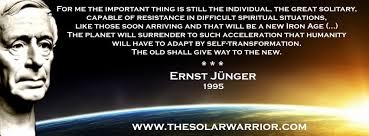
As a person who had a strong chivalrous spirit, Jünger is often described as the last knight of the twentieth century. For him, it was a very painful process, because it was no longer important whether you were a capable warrior, whether you were a noble or not; the only thing that mattered is whether you can operate technology. The arms of the new generation do not require direct physical contact with the enemy, so even a completely weak personality can cause as much harm as possible, simply because they can operate this new technology. So it was a painful process, but at the same time, as a Conservative Revolutionary, Jünger did not develop some reactionary project. He did not whine about the lost ideals of the past. He tried to “ride the tiger,” to use Julius Evola’s metaphor. He said yes, total mobilization is also quite an interesting process, because we can turn it to our advantage. Just like how all of us became Workers, all of us can also become Warriors. We can mobilize to fulfill this plan. We can voluntarily identify ourselves with these impersonal powers of technology. So it was kind of like a collectivist subject.
The later Ernst Jünger, after he saw that nihilism, Nothing, can coexist with new orders very well, he changed his perspective and switched to the individual strategies of resistance to Nothing. And he developed another conception. Instead of the Soldier and the Worker, he suggested the concept of the Waldgänger, who literally is the person who goes into the forest, into the wild, as well as the concept of the Anarch. In Der Waldgänger, an essay written in 1951, he describes the forest as a space of freedom, both metaphorically and physically. For Germans, this is a very important metaphor, of course. The forest is like a symbol of their identity, of German identity, and at the same time, Jünger referred to the old Icelandic concept of freedom. When a person feels threatened in the society, or commits a crime, or simply doesn’t want to be there anymore, he has the right to flee, to go into the wild and preserve his sovereignty. This is a new conception of the Conservative Revolutionary subject. Instead of the Worker and the Soldier, there is the concept of the sovereign individual who searches for a space of freedom.
The concept of the Anarch was introduced in 1977 in Jünger’s futuristic dystopian novel Eumeswil. It is a caricature of modern society, of the German Federal Republic and modern societies – contemporary ones as well, of course. It was an extension of this concept of the Waldgänger, the forest-goer. The difference is that the forest-goer was expelled from society, but the Anarch expels society from himself. He is a sovereign. He remains in society, but is completely detached from it. And he is free. Inherently free. It’s a development of the classic German conception of freedom, which was peculiar also to classic German philosophy. It is usually differentiated from the empty, so-called French conception of freedom as a matter of choice between good and evil, or something like that. In classic German philosophy, as Immanuel Kant suggested, free will, autonomous will – this is a will which is a law unto itself. The will which gives law to itself, and it is opposed to heteronomous will, which is directed through something else, by desire or some other orders.
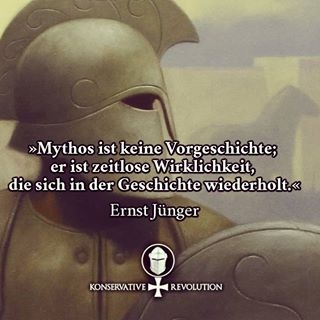 So this is the concept of sovereignty. And the model of the Anarch was represented by a historian, Martin Manuel Venator, who serves in a fortress of the tyrant of a future city-state, Condor. He works in his fortress at night, at the bar, and he listens to different conversations among the visitors and writes down his reflections, and he says, “I am an Anarch in space, and a meta-historian in time.” At first, this conception of the Anarch was taken differently by Ernst Jünger’s colleagues in the Third Way. For instance, Julius Evola believed that the concept of the forest passage, of Der Waldgang, was a betrayal of Jünger’s early views. He said that it is a reverse version of Ernst Jünger as we knew him. It’s as if he felt there was something bourgeois about this concept. But ten years later, Evola developed exactly the same concept of the differentiated personality in his book, Ride the Tiger. He also developed the concept of apoliteia, and later he wrote an essay about the beatniks, hippies, and Right-wing anarchists [3], and you can see that it is the same conception as the Anarch. It’s Right-wing anarchists [4]. And Julius Evola also, just like Jünger, explained that these Right-wing anarchists are different from ordinary anarchists, Leftists, and nihilists, because they revolt not out of sheer nihilism, not simply because they dislike something and they don’t know what to do. These anarchists just like to be rebellious, like all of these modern youth protest movements from the Left, which are just ridiculous – fake freedom, as Jünger says.
So this is the concept of sovereignty. And the model of the Anarch was represented by a historian, Martin Manuel Venator, who serves in a fortress of the tyrant of a future city-state, Condor. He works in his fortress at night, at the bar, and he listens to different conversations among the visitors and writes down his reflections, and he says, “I am an Anarch in space, and a meta-historian in time.” At first, this conception of the Anarch was taken differently by Ernst Jünger’s colleagues in the Third Way. For instance, Julius Evola believed that the concept of the forest passage, of Der Waldgang, was a betrayal of Jünger’s early views. He said that it is a reverse version of Ernst Jünger as we knew him. It’s as if he felt there was something bourgeois about this concept. But ten years later, Evola developed exactly the same concept of the differentiated personality in his book, Ride the Tiger. He also developed the concept of apoliteia, and later he wrote an essay about the beatniks, hippies, and Right-wing anarchists [3], and you can see that it is the same conception as the Anarch. It’s Right-wing anarchists [4]. And Julius Evola also, just like Jünger, explained that these Right-wing anarchists are different from ordinary anarchists, Leftists, and nihilists, because they revolt not out of sheer nihilism, not simply because they dislike something and they don’t know what to do. These anarchists just like to be rebellious, like all of these modern youth protest movements from the Left, which are just ridiculous – fake freedom, as Jünger says.
He says that Right-wing anarchists deny the external world because it doesn’t correspond to their ideal. They keep it inside. They have a very clear understanding of how a healthy world order should be, what it should look like, and they just wait for the opportunity to unfold this understanding in external reality. They just wait for the chance. So they keep it inside, and they bridge it to the future generation, or they just dedicate their own lives to when they can implement it, realize it. So there’s a difference. They preserve this connection with Being, if we refer to Heidegger. It seemed that Evola was strongly influenced by him, although not so much is known about their interactions, just some mentions. The Anarch, as Jünger defines him, is to the anarchist what a monarch is to a monarchist, and in this book he also heavily criticizes various Leftists, demagogues, democrats, anarchists, nihilists. As Jünger explained many times, these people simply try to fill the gap which formed after the age of the Enlightenment – the collapse of religion, the collapse of higher values – but their understanding of freedom is completely empty.
Jünger again does not suggest that we return to some past. He’s not reactionary, he’s not conservative. He attacks the liberal understanding of freedom. He says, “It’s not freedom, sorry.” So he’s not against freedom, he just says it’s a false, anemic freedom which has nothing to do with higher realization for human beings, and he suggests instead this conception of the individual who has an understanding of freedom. And he says, “I am an Anarch, not because I despise authority, but because I need it.” Likewise, I’m a not a believer, but the person who requires something worthy to believe in. So he says that, “I know what can be offered. As a historian, I know what can be offered.” And this Anarch protagonist, this historian Martin Manuel Venator, he often writes about his observations of the Roman Empire, as well as some ancient republics and Eastern theocracies, so he is a person with a very developed, encyclopedic knowledge. And we really see, by following his reflections and considerations, that he knows what can be offered, and that what he wants isn’t what can be offered by modern, demo-liberal societies.
So the Anarch is, I would say, a world-historical figure, and not only some concept of the sovereign individual, which has a vertical meta-historical extension. He bridges this gap between meta-historical eons. We can interpret him as something like a keeper. As I said, he’s a link bridging eons. In this respect, the Anarch is the person who keeps this healthy, true order inside, preserves it, and passes it over to those who will be able to implement it, or simply waits for the chance to implement it in external reality. So in this respect, this is the person who challenges Nothing. It is the final phase of the transvaluation of all values. And that is why, to sum up, Jünger said that we should be friends both with the Titans and with the Gods. And again, in this metaphor, in the philosophy of culture, the Titans stand for productivity, this Faustian speed, activism, voluntarism, this expansion, work. And it also has strong features, Jünger emphasized them in the early period of his work: impersonal power, warriors, spirit, resistance to pain, and the ability to self-objectify yourself, in this really impersonal something.
And this also, of course, has weak sides. Useless routine. Everything we are captured in today, this myth about Sisyphus, who repeats the same work all the time – it’s devoid of meaning, because the patrons of meaning are the gods, according to Jünger. They stand for memory, for culture. Today, cemeteries are neglected because nobody wants to remember. Everybody just wants to be fast, wants to change, to gain some new experience, to move on a global scale, and so on and so forth. Whereas the gods, the patrons of memory, culture, history, higher values, ethics, poetry, and so on and so forth, they stand for everything that is highest, everything fragile. It is something that has to be sheltered and protected in the modern world. So in his final works, Jünger predicted that the entire twenty-first century would still be the reign of the Titans. But the gods will return, as they always do. But it will not be another cycle, in terms of the cyclic concept of history; it will be a new eon.
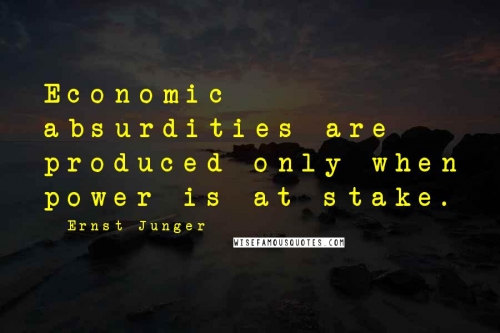
We stand at the wall of time. When the Titans entered the historical stage during the First World War, it was already the end of anthropocentric history. And after the twenty-first century, we will face something completely new. So it’s a very interesting conception in the field of the philosophy of history – it is neither linear, nor cyclic. And, again, Jünger says that our understanding of freedom in this future meta-historical eon will be completely different, and we just have to prepare for it. It is something very similar to what Heidegger said, but more optimistic, I would say. And it’s something we have to prepare ourselves for right now, both in metaphysical thinking, because it directly affects our behavior, our strategy, and the historical reality we live in, and in practice.



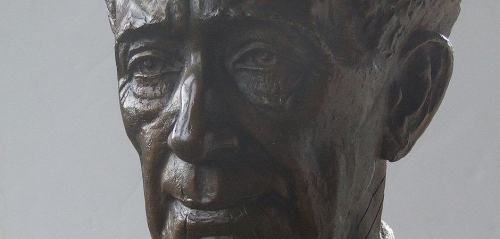

 del.icio.us
del.icio.us
 Digg
Digg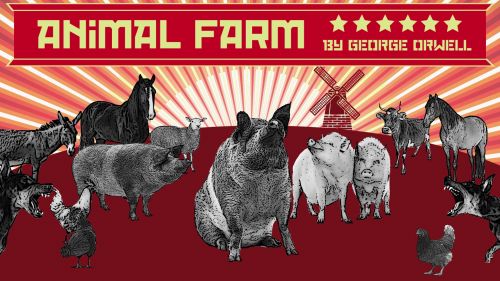
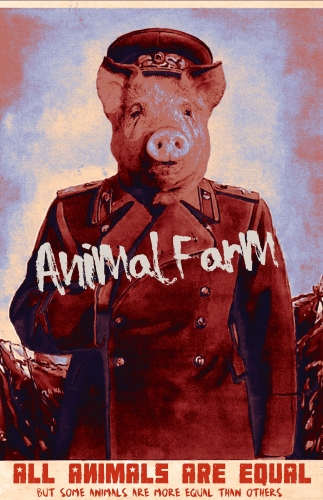 When Orwell finished Animal Farm in 1945, it was a very bad time to promote anti-Communist books with talking animals. This one was too clearly an allegory about the Bolshevik Revolution and the Stalinist aftermath, as subtle as a cow-pie (one barnyard feature that does not appear in the book). Over two dozen publishers rejected it promptly; Churchill’s coalition government had been touting a pro-Soviet line since 1941. Against this background, Animal Farm was about as welcome as a sympathetic book review of Mein Kampf (which Orwell did in fact once publish, during the Phony War period).
When Orwell finished Animal Farm in 1945, it was a very bad time to promote anti-Communist books with talking animals. This one was too clearly an allegory about the Bolshevik Revolution and the Stalinist aftermath, as subtle as a cow-pie (one barnyard feature that does not appear in the book). Over two dozen publishers rejected it promptly; Churchill’s coalition government had been touting a pro-Soviet line since 1941. Against this background, Animal Farm was about as welcome as a sympathetic book review of Mein Kampf (which Orwell did in fact once publish, during the Phony War period).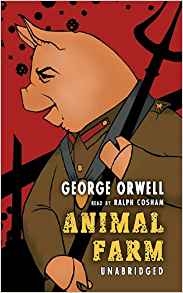 But the use of pigs raises all sorts of other complications. All the male pigs but Napoleon, we are told, have been castrated. This fact is introduced late in the book, and rather obliquely: “Napoleon was the only boar on the farm.” But hold on: Napoleon has sired many porkers, presumably male often as not. Surely they’re still intact – some of them, anyway. Is Orwell just being forgetful, or does he fear certain distasteful matters will slow down the story?
But the use of pigs raises all sorts of other complications. All the male pigs but Napoleon, we are told, have been castrated. This fact is introduced late in the book, and rather obliquely: “Napoleon was the only boar on the farm.” But hold on: Napoleon has sired many porkers, presumably male often as not. Surely they’re still intact – some of them, anyway. Is Orwell just being forgetful, or does he fear certain distasteful matters will slow down the story?